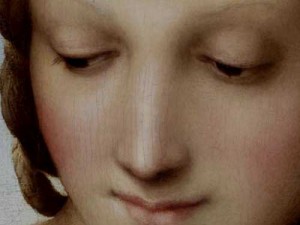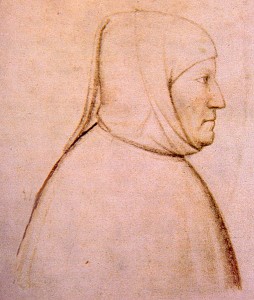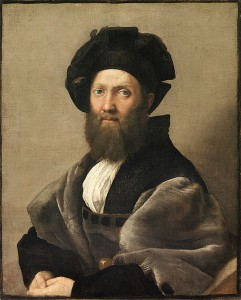1.3- Humanism During the Renaissance
Characteristics of Humanism:
[audio:humanism.mp3]- A philosophical belief
- A study of Greek philosophers
- Celebration of human achievement
- Emphasis on human reason, spirit, and physical beauty
- The Medicis and The Platonic Academy of Philosophy in Florence

Section of “Madonna of the Meadow” Raphael, 1505, Florence, Italy Click for more info
Petrarch – the Father of Humanism
[audio:petrarch.mp3]
- Latin scholar and poet
- Studied Latin poets — Virgil and Cicero
- High moral tone
- Wrote sonnets — love for Laura
- Extended metaphors
- Widely imitated
More information at https://italian.about.com/library/weekly/aa021600a.htm
Other Writers Who Defined Humanism
Marsilo Ficino – Theologia Platonica
[audio:ficino.mp3]Click on the Theologia Platonica link and then click on the “preview the book” link to get a little taste of what Ficino wrote.
- Head of the Platonic Academy in Florence
- His writings shaped Neo-Platonism and Humanism during the Renaissance
More information at https://www.renaissanceastrology.com/ficino.html
Pico della Mirandola – Oration on the Dignity of Man
[audio:mirandola.mp3]More information at: https://www.alcott.net/alcott/home/champions/Pico.html
Baldasasare Castiglione – The Courtier
[audio:castiglione.mp3]More information at: https://en.wikipedia.org/wiki/The_Book_of_the_Courtier


 |
|
No. 1 — October 10th, 2009 at 1:07 pm
I like the emphasis on the importance of the individual aspect of Humanism because I think it it makes people more responsible for themselves. It is interesting that physical beauty was related to divinity that seems to be more abstract. If one was considered ugly would they be judged as a sinful person?
No. 2 — June 2nd, 2010 at 10:19 am
I think that maybe they would not be judged as a sinful person, but perhaps someone who was simply not in favor with God?
No. 3 — June 4th, 2010 at 12:30 am
ur articles is very useful
No. 4 — June 4th, 2010 at 10:12 am
“Ugly” and “deformed” people back then were considered as evil entities, which can be verified by the literature during that period. Chretien de Troyes’ Knight of the Cart depicts a little person (what he refers to as “dwarf” in the story) as a wily man who tricks Lancelot; moreover, as he hauls a cart – which, in the story, was an ominous thing in those days – he is directly associated with criminals and villains.
No. 5 — September 9th, 2010 at 10:35 am
If beauty is gods love. One has to wonder how the unfortunate were treated.
No. 6 — September 11th, 2010 at 7:53 pm
It sounds like the humanism’s idea of choice goes more along the lines of free will than simply rolling with the punches and learning how to just accept one’s situations.
No. 7 — September 14th, 2010 at 5:54 pm
I wonder how people during the renaissance period transited to the importance of an individual.It seems that the existence of individuality came about this time.
No. 8 — February 8th, 2011 at 8:48 pm
If beauty is gods love, even in the human form I can’t help but wonder how often Gods love was abused.
No. 9 — February 15th, 2012 at 9:43 pm
The idea of humanists is that people can chose and those choices affect Gods love for you and when you make the right choices God shows his love for through your own appearance there for the more beautiful a person is the more God loves them therefor the more pure they are and the “ugly” or “deformed” person is the further from God therefor the more sinful.
No. 10 — September 16th, 2012 at 7:58 pm
The pursuit of the highest and best in truth, goodness, and beauty is a departure from the focus in the Middle Ages on fear and sin. Although the idea that beauty is the highest expression of God’s intentions may seem shallow to us today, the entire idea of beauty was different during the Renaissance and connected physical beauty with inner or moral beauty of character. Today beauty has been disconnected from character and is manipulated by consumerism and social design.
No. 11 — January 14th, 2014 at 1:54 pm
[…] Next: Humanism […]
No. 12 — February 8th, 2014 at 1:06 pm
The way we see ourselves is how we allow humanism to show in the art. I liked all the good pictures they were beautiful, but when the evil side showed up, it was very ugly and dark
No. 13 — May 19th, 2014 at 1:55 pm
I like how more things are being thought though and things are starting to be questioned. I like that they are not excepting everything the way that it is.